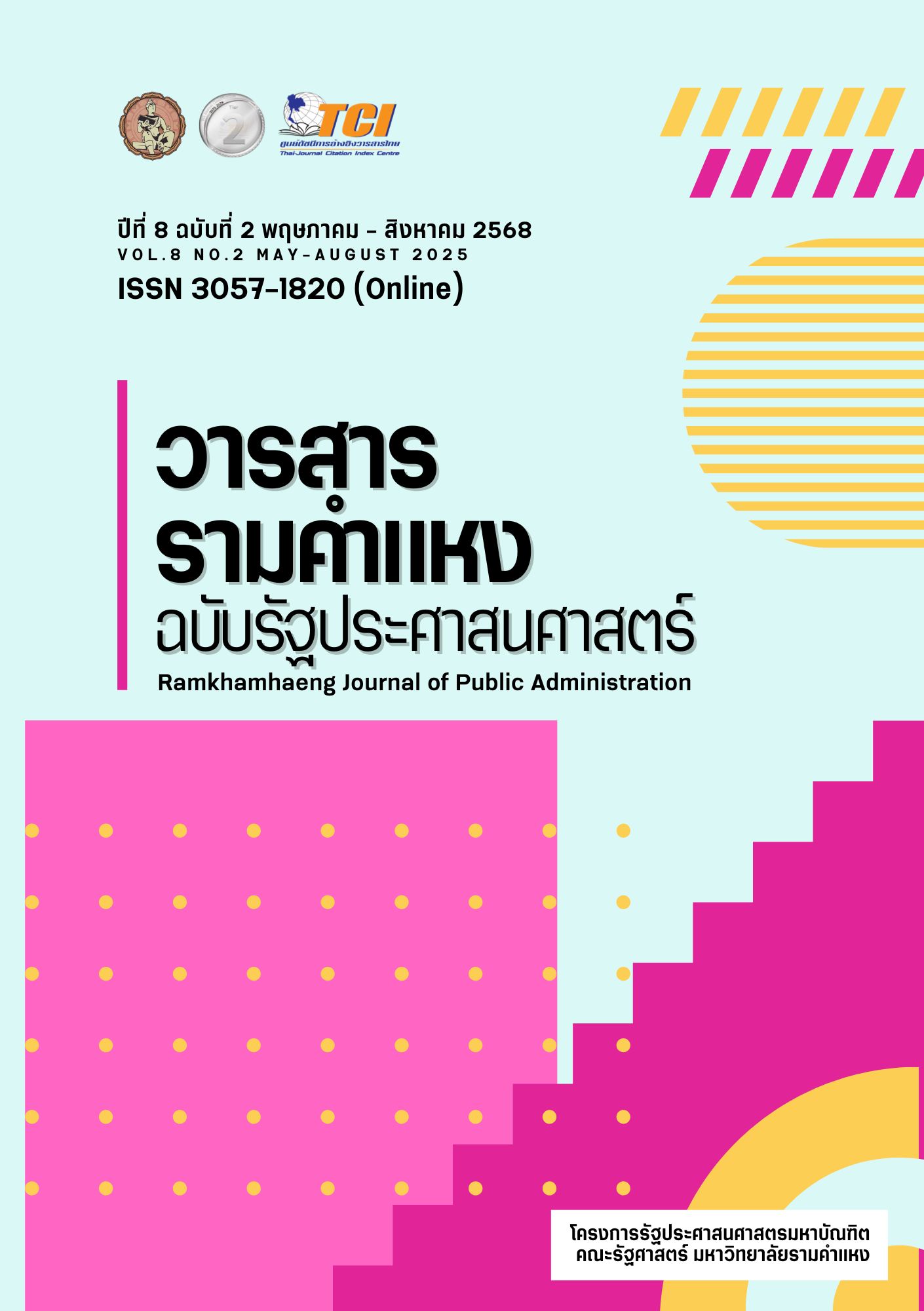Thailand’s Response Policy and Measure on Food Fraud in The World Market During the Year 2003-2022
Keywords:
The Infiltration of Food Fraud, International Response, Thailand’s Policy and MeasurementAbstract
The underlying functions of the state, such as to providing public services for their citizen and to protect citizen’s life and wellbeing were the fundamental accountability of the state. State normally issues policies and measures to control and minimize food hazard. Now a day, states all over the world has a new challenge with hazardous food that were intentionally mixed with uneatable substances in it, such as melamine or other toxic chemicals and sale as normal food. The only reason is to make more profit for the unscrupulous producers. The result of food fraud phenomena always ends up with the undermining health of the consumers around the world. The purposes of this research are to study functions of the states internationally, how they counteracted with food fraud incidents and also to find the role and obstacles that Thailand’s state agencies are facing. In conclusion, this research has shown the results that, all nation states had the same protocols in counteract with food fraud incidents which are to protect, terminate, surveillance and also initiate the incident response plan in case of the outbreak of food fraud that disguised and infiltrated into the world market, unpredictably off guard. And also found the obstacles for running the operation in counteract with food fraud issues that Thailand’s state agencies have in common, which are the limitation of resources such as insufficient number of skilled personal, inadequate of budget, lack of test kits for laboratory test.
References
กองอาหาร. (2568). กฎหมายอาหาร (พระราชบัญญัติอาหาร พ.ศ.2522 และประกาศกระทรวงสาธารณสุขและอื่นๆ ที่เกี่ยวข้อง). ค้นเมื่อ 31 พฤษภาคม 2568, จาก https://food.fda.moph.go.th/food-law/sum-law/
จักรี ไชยพินิจ. (2558). แนวการวิเคราะห์ทางการเมืองเชิงสถาบันของเบเวอรี่ ครอเฟิร์ด: บทวิเคราะห์เชิงวิพากษ์. วารสารเศรษฐศาสตร์การเมืองบูรพา, 3(1), 1-27.
ณัฐฐิพร อนันตศิริ. (2560). ปัญหาทางกฎหมายเกี่ยวกับมาตรการควบคุมผลิตภัณฑ์อาหารที่ไม่ปลอดภัยในท้องตลาด. สารนิพนธ์นิติศาสตรมหาบัณฑิต, มหาวิทยาลัยศรีปทุม.
ณัฏฐ์ระพี วงศ์ชนเดช. (2562). ปัญหาทางกฎหมายด้านการควบคุมระบบคุณภาพความปลอดภัยทางอาหาร. วิทยานิพนธ์นิติศาสตรมหาบัณฑิต, สถาบันบัณฑิตพัฒนบริหารศาสตร์.
ผู้จัดการออนไลน์. (2567). อย. เผาของกลางผลิตภัณฑ์สุขภาพ 96 คดี 3.4 หมื่น กก. รวม 200 ล.บาท. ค้นเมื่อ 14 ธันวาคม 2567, จาก https://mgronline.com/qol/detail/9670000026295
พระราชบัญญัติอาหาร พ.ศ. 2522 มาตรา 4. (2522). ค้นเมื่อ 8 สิงหาคม 2565, จาก https://laws.fda.moph.go.th /laws/food-act-be-2522
ราชกิจจานุเบกษา. (2560). รัฐธรรมนูญแห่งราชอาณาจักรไทย พุทธศักราช 2560. ค้นเมื่อ 29 สิงหาคม 2565, จาก http://www.ratchakitcha.soc.go.th/DATA/PDF/2560/A/040/1.PDF
Elizabeth Montes Saavedra. (2014). From ‘food to fraud’: The continuous battle against dishonest practices in the food chain. A comparative analysis between the European and the American food fraud control systems. Master Thesis, Wageningen University, Netherlands. Retrieved 27 March, 2023, from https://edepot.wur.nl/304294
Gilman, N., Goldhammer, J., and Weber, S. (2011). Deviant globalization: Black market economy in the 21st century. New York: The Continuum International Publishing Group.
Manning, L. & Soon, J. M, (2016). Food safety, food fraud and food defense: A fast evolving literature. Journal of Food Science, 81(4), R823-34. doi: 10.1111/1750-3841.13256.
Midler, P. (2011). Poorly made in China. Hoboken, NJ: John Wiley & Sons.
Political Science. (2019). Theory of state functions. Retrieved July 10, 2024, from https://www.politicalscienceview.com/theories-of-state-functions/
Red Point. (2022). Inside China’s toxic counterfeit food industry. Retrieved July 4, 2022, from https://www.redpoints.com/blog/inside-chinas-toxic-counterfeit-food-industry/
Rhodes, R. A. W. (2007). Peripheral Vision (of organizational studies): Understanding Governance: Ten Years On, Retrieved July 4, 2022, from https://www.researchgate .net/publication/233870082_ Understanding_Governance_Policy_Networks_ Governance_Reflexivity_ and_Accountability
Roberts, H. R. (1981). Food safety. Hoboken, NJ: John Willey & Sons.
Skocpol, T. (1982). Bringing the state back in: A report on current comparative research on the relationship between states and social structures. Retrieved July 4, 2022, from https://items.ssrc.org/from-our-archives/bringing-the-state-back-in-a-report-on-current-comparative-research-on-the-relationship-between-states-and-social-structures/
Thai Embassy. (2565). การวิเคราะห์ SWOT (SWOT Analysis). Retrieved June 25, 2023, from
https://helsinki.thaiembassy.org/th/page/65202%E0%B8%81%E0%B8%B2%E0%B8%A3%E0%B8%A7%E0%B8%B4%E0%B9%80%E0%B8%84%E0%B8%A3%E0%B8%B2%E0%B8%B0%E0%B8%AB%E0%B9%8C-swot-(swot-analysis)?menu= 5f28fef3d3a8ab75420 d47d3
USFDA. (2007). Melamine Pet Food Recall of 2007. Retrieved April 2, 2024, from https://web.archive.org/web/20090612173809/http://www.fda.gov/AnimalVeterinary/SafetyHealth/RecallsWithdrawals/ucm129575.htm
WHO, Food Safety. (2024). International food safety authorities network. Retrieved March 25, 2024, from https://www.who.int/groups/fao-who-international-food-safety-authorities-network-infosan/about
Downloads
Published
How to Cite
Issue
Section
Categories
License
Copyright (c) 2025 พงษ์พันธ์ โสมาภา

This work is licensed under a Creative Commons Attribution-NonCommercial-NoDerivatives 4.0 International License.



